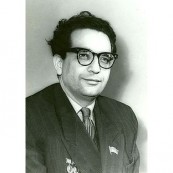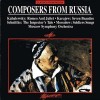Composers
Gara Abulfaz oghlu Garayev (Azerbaijani: Qara Əbülfəz oğlu Qarayev, February 5, 1918, Baku – May 13, 1982, Moscow), also spelled as Qara Qarayev or Kara [Abulfazovich] Karayev, was a prominent Azerbaijani composer of the Soviet period. Garayev wrote nearly 110 musical pieces,[1] including ballets, operas, symphonic and chamber pieces, solos for piano, cantatas, songs, and marches, and rose to prominence not only in Azerbaijan SSR but also in the rest of the Soviet Union and worldwide.
Garayev was born into a family of pediatricians, which was famous in Baku. His mother, Sona, was among the first graduates of the Baku-based school of the Russian Music Society. Garayev's younger brother, Mursal, became a surgeon, but died at an early age.
In 1926, at the age of eight, Gara Garayev first entered the junior music school at the Azerbaijan State Conservatoire, currently known as the Baku Music Academy. Due to his musical talents, Garayev was allowed to enroll simultaneously in two faculties at the Azerbaijan State Conservatoire in 1933. Among his teachers were Georgi Sharoyev, Leonid Rudolf, and the prominent Azerbaijani composer Uzeyir Hajibeyov. In 1937, Garayev joined the Union of Composers of Azerbaijan SSR.
In 1938, at the age of twenty, Garayev composed his first musical piece, a cantata "The Song of the Heart" to the poem by Rasul Rza. It was performed in Moscow's Bolshoi Theater in the presence of Joseph Stalin in the same year. Garayev conducted his cantata during the Decade of Azerbaijani Art festival in the Bolshoi Theater, an event also attended by Stalin. In the same year, Garayev moved to the Moscow State Conservatoire, where he became a student and a good friend of Dmitri Shostakovich.
In 1941 Garayev returned to Baku to teach at Azerbaijan State Philharmonic Society. In 1945, both he and Jovdat Hajiyev wrote the Motherland ("Vətən") opera, for which they were awarded a prestigious Stalin Prize. In 1948, at the age of 30, Garayev was again awarded this prize for his symphonic poem Leyli and Majnun, based on the same-titled famous work of Nizami Ganjavi. Upon the death of Uzeyir Hajibeyov in 1948, Garayev became the Chair of the Union of Composers of Azerbaijan SSR and the rector of the Azerbaijan State Conservatoire. In this latter position, Garayev retained Uzeyir Hajibeyov's traditional emphasis on Azerbaijani folk music in teaching, and also promoted contemporary genres, such as jazz in Azerbaijani music. In 1948 Garayev also became the delegate to the First National USSR Congress of Soviet Composers. In the same year Garayev also headed the Music Department at the Azerbaijan Architecture and Art Institute.
In 1952, under the direction of the choreographer P. A. Gusev, Garayev's Seven Beauties ballet was staged at the Azerbaijani Theater of Opera and Ballet. Based on Nizami Ganjavi's famous poem, Seven Beauties ("Yeddi gözəl") it became the first Azerbaijani ballet and opened a new chapter in the history of classical music of Azerbaijan. Garayev's only other ballet, Path of Thunder ("İldırımlı yollarla"), staged in 1958, was dedicated to racial conflicts in South Africa.[3] In the same year, Garayev also wrote the score for the documentary film A Story About the Oil Workers of the Caspian Sea, directed by Roman Karmen and set at the Oil Rocks.
During his teaching career at the Azerbaijan State Conservatoire, Garayev tutored a number of prominent Azerbaijani musicians and composers, including Niyazi, Arif Malikov, Khayyam Mirzazade and Ismayil Hajibeyov among others. Garayev's son, Faraj (born 1943), also became his student and went on to compose single-act ballets such as Shadows of Qobustan ("Qobustanın kölgələri") and Kaleidoscope, and later led the musical avant-garde movement in Azerbaijan.
During the Cold War in June 1961, Garayev and Tikhon Khrennikov were the only two Soviet composers who attended the first International Los Angeles Music Festival held at UCLA.[4] Fifteen composers from seven nations presented their works, including Arnold Schoenberg and Igor Stravinsky. On June 11, Franz Waxman conducted the Festival Symphony Orchestra with a suite from Garayev's Path of Thunder.
In 1962 Garayev became a member of the Supreme Soviet of the USSR and visited the United States, Ethiopia, and Lebanon. In 1972 he visited Poland.
Garayev suffered from heart disease, which prevented him from attending his own 60th jubilee celebration held in Baku, where he was awarded the title of the Hero of Socialist Labor. Garayev spent the last five years of his life in Moscow, away from the public, although his love for Baku remained strong and was reflected in his writing:
“ To me, Baku is the most beautiful city in the world. Every morning, when the city wakes whether it be to the sun or the rain and fog, every morning my city sings. Baku is meant for art. It gives me so much pleasure to write about this city no matter if you write music, verse or paint images. ”
Garayev died on May 13, 1982 in Moscow at the age of 64. His body was flown to Baku and buried at the Alley of Honor.
Refine by search
view allBiography
Gara Abulfaz oghlu Garayev (Azerbaijani: Qara Əbülfəz oğlu Qarayev, February 5, 1918, Baku – May 13, 1982, Moscow), also spelled as Qara Qarayev or Kara [Abulfazovich] Karayev, was a prominent Azerbaijani composer of the Soviet period. Garayev wrote nearly 110 musical pieces,[1] including ballets, operas, symphonic and chamber pieces, solos for piano, cantatas, songs, and marches, and rose to prominence not only in Azerbaijan SSR but also in the rest of the Soviet Union and worldwide.
Garayev was born into a family of pediatricians, which was famous in Baku. His mother, Sona, was among the first graduates of the Baku-based school of the Russian Music Society. Garayev's younger brother, Mursal, became a surgeon, but died at an early age.
In 1926, at the age of eight, Gara Garayev first entered the junior music school at the Azerbaijan State Conservatoire, currently known as the Baku Music Academy. Due to his musical talents, Garayev was allowed to enroll simultaneously in two faculties at the Azerbaijan State Conservatoire in 1933. Among his teachers were Georgi Sharoyev, Leonid Rudolf, and the prominent Azerbaijani composer Uzeyir Hajibeyov. In 1937, Garayev joined the Union of Composers of Azerbaijan SSR.
In 1938, at the age of twenty, Garayev composed his first musical piece, a cantata "The Song of the Heart" to the poem by Rasul Rza. It was performed in Moscow's Bolshoi Theater in the presence of Joseph Stalin in the same year. Garayev conducted his cantata during the Decade of Azerbaijani Art festival in the Bolshoi Theater, an event also attended by Stalin. In the same year, Garayev moved to the Moscow State Conservatoire, where he became a student and a good friend of Dmitri Shostakovich.
In 1941 Garayev returned to Baku to teach at Azerbaijan State Philharmonic Society. In 1945, both he and Jovdat Hajiyev wrote the Motherland ("Vətən") opera, for which they were awarded a prestigious Stalin Prize. In 1948, at the age of 30, Garayev was again awarded this prize for his symphonic poem Leyli and Majnun, based on the same-titled famous work of Nizami Ganjavi. Upon the death of Uzeyir Hajibeyov in 1948, Garayev became the Chair of the Union of Composers of Azerbaijan SSR and the rector of the Azerbaijan State Conservatoire. In this latter position, Garayev retained Uzeyir Hajibeyov's traditional emphasis on Azerbaijani folk music in teaching, and also promoted contemporary genres, such as jazz in Azerbaijani music. In 1948 Garayev also became the delegate to the First National USSR Congress of Soviet Composers. In the same year Garayev also headed the Music Department at the Azerbaijan Architecture and Art Institute.
In 1952, under the direction of the choreographer P. A. Gusev, Garayev's Seven Beauties ballet was staged at the Azerbaijani Theater of Opera and Ballet. Based on Nizami Ganjavi's famous poem, Seven Beauties ("Yeddi gözəl") it became the first Azerbaijani ballet and opened a new chapter in the history of classical music of Azerbaijan. Garayev's only other ballet, Path of Thunder ("İldırımlı yollarla"), staged in 1958, was dedicated to racial conflicts in South Africa.[3] In the same year, Garayev also wrote the score for the documentary film A Story About the Oil Workers of the Caspian Sea, directed by Roman Karmen and set at the Oil Rocks.
During his teaching career at the Azerbaijan State Conservatoire, Garayev tutored a number of prominent Azerbaijani musicians and composers, including Niyazi, Arif Malikov, Khayyam Mirzazade and Ismayil Hajibeyov among others. Garayev's son, Faraj (born 1943), also became his student and went on to compose single-act ballets such as Shadows of Qobustan ("Qobustanın kölgələri") and Kaleidoscope, and later led the musical avant-garde movement in Azerbaijan.
During the Cold War in June 1961, Garayev and Tikhon Khrennikov were the only two Soviet composers who attended the first International Los Angeles Music Festival held at UCLA.[4] Fifteen composers from seven nations presented their works, including Arnold Schoenberg and Igor Stravinsky. On June 11, Franz Waxman conducted the Festival Symphony Orchestra with a suite from Garayev's Path of Thunder.
In 1962 Garayev became a member of the Supreme Soviet of the USSR and visited the United States, Ethiopia, and Lebanon. In 1972 he visited Poland.
Garayev suffered from heart disease, which prevented him from attending his own 60th jubilee celebration held in Baku, where he was awarded the title of the Hero of Socialist Labor. Garayev spent the last five years of his life in Moscow, away from the public, although his love for Baku remained strong and was reflected in his writing:
“ To me, Baku is the most beautiful city in the world. Every morning, when the city wakes whether it be to the sun or the rain and fog, every morning my city sings. Baku is meant for art. It gives me so much pleasure to write about this city no matter if you write music, verse or paint images. ”
Garayev died on May 13, 1982 in Moscow at the age of 64. His body was flown to Baku and buried at the Alley of Honor.




